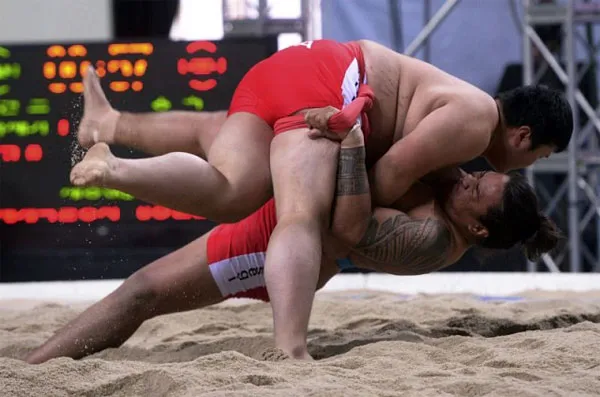Các quan chức văn hóa Hàn Quốc hôm nay 26/11 cho biết Ủy ban UNESCO đang xem xét quyết định có đưa môn đấu vật cổ truyền của hai miền Triều Tiên vào danh sách “Di sản văn hóa phi vật thể của nhân loại” hay không trong tuần này.

Hàn Quốc và Triều Tiên cùng trình hồ sơ chung xét công nhận đấu vật là di sản văn hóa lên UNESCO. Ảnh: AP
Trước đó, Hàn Quốc và Triều Tiên cũng đã gửi hồ sơ trình UNESCO xét công nhận nhưng riêng rẽ. Sự hợp tác lần này cũng không nằm ngoài các động thái làm giảm căng thẳng tại bán đảo Triều Tiên. Truyền thông địa phương cho biết Hàn Quốc là phía đề xuất đầu tiên việc trình hồ sơ chung này tại cuộc họp thượng đỉnh hồi tháng 4 vừa rồi.
Tuy có khác biệt về cách phiên âm latinh tên bộ môn đấu vật, Hàn Quốc đọc là “ssireum” còn Triều Tiên là “ssirum” nhưng trong hồ sơ chung này cả hai đều thống nhất đưa cả hai cách phát âm vào.
Triều Tiên đã giành được công nhận của UNESCO cho hai di sản văn hóa cùng nằm trong danh sách đề nghị công nhận từ phía Hàn Quốc đó là dân ca “Airrang” và món kim chi.
Môn đấu vật cổ truyền này đã rất thịnh tại hai miền Triều Tiên giai đoạn trước năm 1980 trước khi các môn thể thao khác như bóng chày hay bóng đá được du nhập và phổ biến.
Koreas bid for UNESCO recognition of traditional wrestling
(AP) — North and South Korea are making a first joint bid for an international recognition of Korean traditional wrestling.
South Korean culture officials on Monday said a UNESCO committee is set to determine whether to add the Korean wrestling to its list of "Intangible Cultural Heritage of Humanity" this week.
The Koreas had earlier pushed separate bids for the sport's UNESCO recognition, but the cooperation follows an easing of tension on the divided peninsula amid a flurry of exchanges this year. Local media reports said South Korea had first proposed the joint bid during a leaders' summit at the Korean border village in April.
The Koreas were originally a single country before their separation in 1945. Split along the world's most heavily fortified border, the countries now have linguistic, cultural and other gaps.
They use different English Romanization rules. The wrestling's English spelling is "ssirum" in North Korea and "ssireum" in South Korea. According to South Korea's Cultural Heritage Administration, the Koreas use both spellings for their combined bid.
North Korea has won UNESCO recognitions of two Korean cultural assets — the Korean folk tune "Airrang" and the making of Kimchi. The two are among the 19 items that South Korea has received UNESCO recognition for, according to South Korean officials.
In the ancient wrestling, participants with a belt around their waists and thighs use their hands, legs and other body parts to bring down their opponents to the sand ground. It was widely popular in South Korea in the 1980s before other sports such as baseball and soccer gained in popularity.
